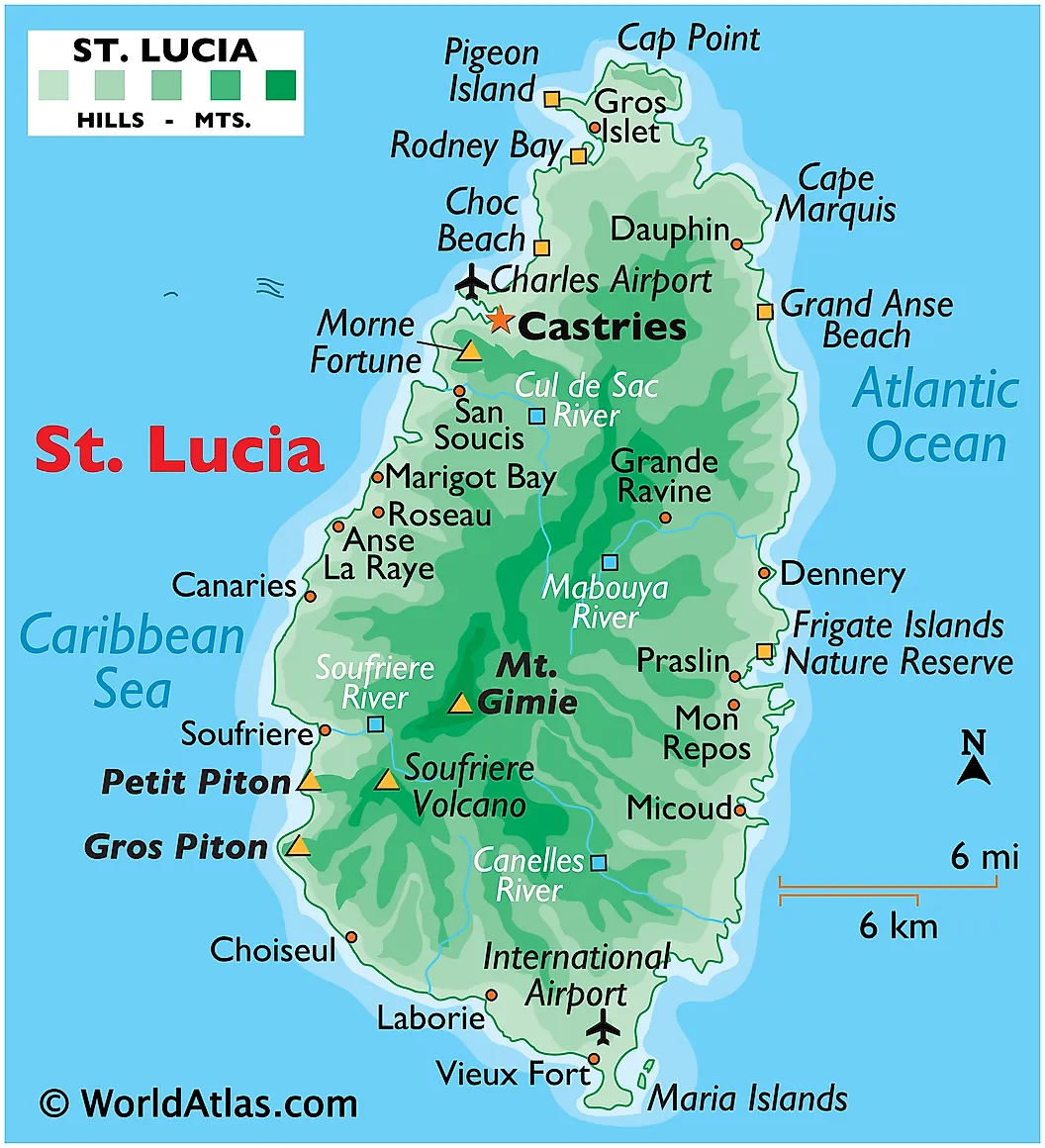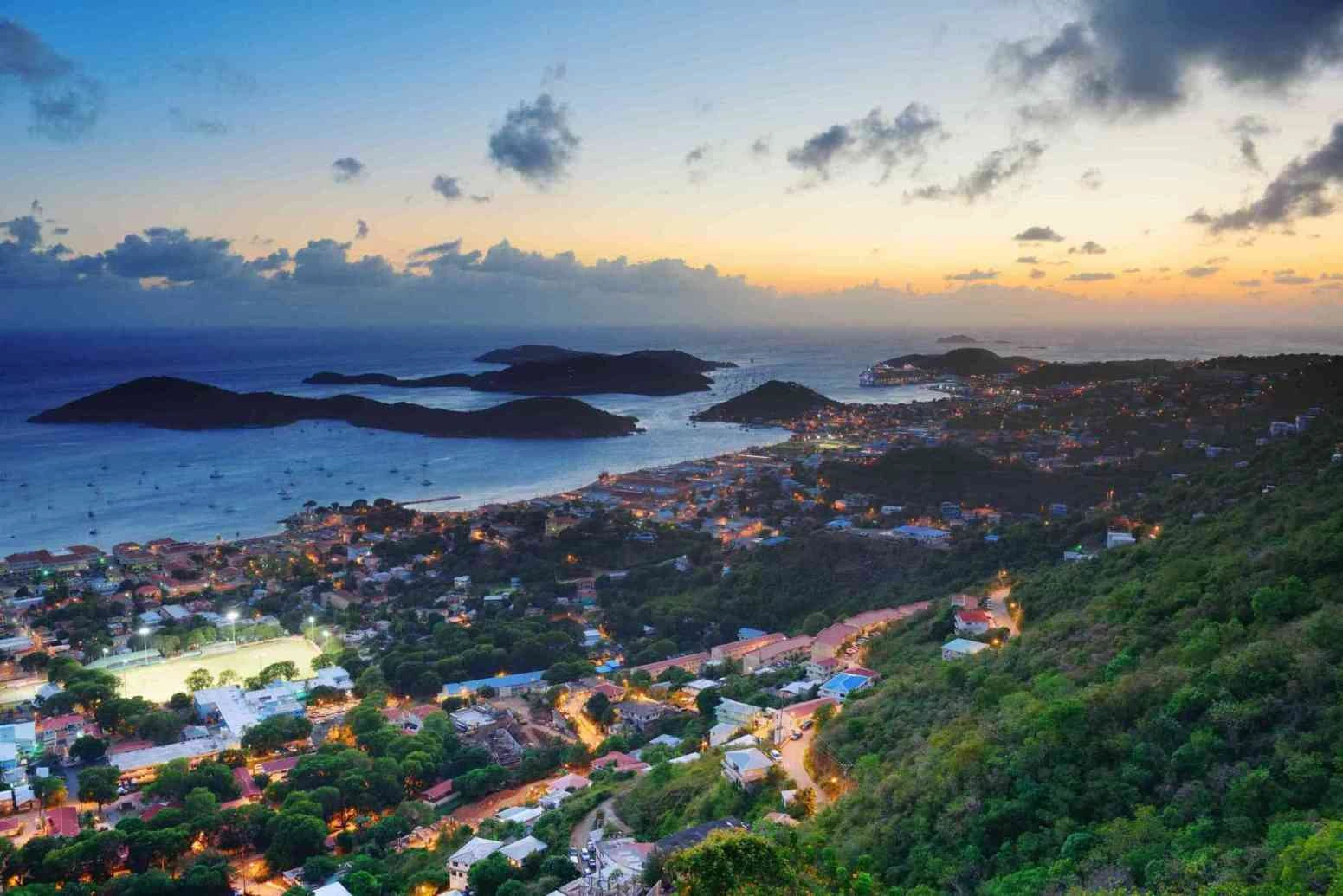Is St Lucia Safe in 2025? Travel Safety Guide & Tips
- Ahmed hamdy Ahmed hamdy
- 0 Comments
If you’re wondering “Is St Lucia safe?” before planning your next trip or having St Lucia citizenship by investment or naturalization, you’re not alone. Safety is one of the primary concerns for travelers visiting this Caribbean paradise. St Lucia is renowned for its lush rainforests, volcanic peaks, and stunning beaches, but like any international destination, it’s natural to ask: Is St Lucia safe to travel to right now?
The short answer:
Yes, St Lucia is considered safe for tourists when normal precautions are taken. The U.S. State Department lists it as Level 1: Exercise Normal Precautions. Petty theft is the most common risk, while violent crime rarely targets tourists. Resorts and guided tours are generally very secure, though travelers should avoid isolated areas at night, use licensed taxis, and stay alert during hurricane season (June–November).
This guide breaks down everything you need to know about St Lucia safety in 2025. From crime risks and hurricane season to health precautions and cultural laws, we’ll cover practical advice for families, solo travelers, and anyone considering a trip to this Caribbean gem.
Where Is St Lucia? – Map and Quick Facts
Source: Maps of Saint Lucia
St Lucia is a volcanic island in the eastern Caribbean Sea, part of the Lesser Antilles. It sits between Martinique to the north and St Vincent to the south, with Barbados located to the southeast. On a map of St Lucia, you’ll see it positioned within the Caribbean’s “hurricane belt,” though its southern location often spares it from the worst storms.
Tip: You can find official information on the St Lucia Tourism Authority website
Quick Facts for Travelers
-
Capital: Castries
-
Language: English (with Saint Lucian Creole widely spoken)
-
Currency: Eastern Caribbean Dollar (EC$), though U.S. dollars are commonly accepted
-
Population: Approx. 180,000
-
Tourist Hubs: Rodney Bay, Gros Islet, Soufrière, Marigot Bay
-
Time Zone: Atlantic Standard Time (AST), GMT-4
-
Climate: Tropical, with dry season (December–May) and wet season (June–November)
Why Safety Concerns Arise
Like many Caribbean destinations, St Lucia has contrasting sides. Luxury resorts, pristine beaches, and tourist-friendly zones are generally very safe. However, certain urban neighborhoods and rural areas may experience higher crime rates or poor infrastructure. The island is also vulnerable to seasonal weather hazards, making safety awareness essential for every visitor.
Official Travel Advisory & Risk Ratings
Before traveling to any international destination, it’s wise to review what official government sources say about safety. St Lucia is no exception. While most visitors enjoy trouble-free vacations, the island still has certain risks that travelers should be aware of. To provide a clear picture, here’s how major governments — including the United States, Canada, and the United Kingdom — currently rate St Lucia’s safety and the key precautions they recommend.
U.S. State Department Travel Advisory
As of 2025, the U.S. State Department ranks St Lucia at Level 1: Exercise Normal Precautions. This means the island is considered among the safer Caribbean destinations for American travelers.
Level 1 advisories are reserved for countries where the risks are comparable to those at home. Still, tourists are encouraged to remain aware of their surroundings, secure their valuables, and avoid risky behaviors at night.
Canada Travel Advisory
The Government of Canada also advises travelers to exercise normal safety precautions in St Lucia. However, Canadian authorities note that violent crime — particularly gang-related shootings — has occurred in certain districts. They recommend heightened awareness in urban centers like Castries and Vieux Fort, especially after dark.
UK Government Travel Advisory
The UK’s Foreign, Commonwealth & Development Office (FCDO) warns that incidents of armed robbery, sexual assault, and petty theft do occur. Tourists are advised to avoid isolated areas, crowded events, or beaches at night.
Key advice includes:
-
Secure accommodations and yachts.
-
Use licensed taxis only.
-
Avoid carrying large amounts of cash.
-
Stay alert during major festivals like Carnival or the St Lucia Jazz Festival.
Safety Compared to Other Caribbean Islands
Compared to some nearby destinations, St Lucia remains relatively safe for tourists. For instance:
-
Grenada has higher safety scores.
-
Jamaica and Trinidad generally have higher violent crime rates.
-
St Lucia ranks in the middle tier — not crime-free, but safer than some regional neighbors when basic precautions are taken.
Types of Crime in St Lucia
Crime in St Lucia can be divided into two main categories: petty theft and violent crime.
-
Petty crime (pickpocketing, bag-snatching, car break-ins) is the most common issue for tourists, especially in crowded areas like markets, festivals, or busy beaches.
-
Violent crime (armed robbery, shootings, assaults) does occur, but it is rarely targeted at tourists. Many incidents are connected to local gang activity and typically occur outside tourist zones.
Most visitors report trouble-free trips. By following common-sense precautions, you can significantly lower your risk.
Are Tourists Targets in St Lucia?
Tourists are not the primary targets of crime. However, foreigners may attract attention if they display expensive jewelry, electronics, or large sums of cash. Opportunistic thieves may attempt bag-snatching, especially in crowded or poorly lit areas.
Tips:
-
Keep valuables secured in your hotel safe.
-
Carry only small amounts of cash when going out.
-
Use a crossbody bag or anti-theft backpack.
-
Stay alert in markets, bus stations, and nightlife areas.
Areas to Avoid vs Safer Zones
St Lucia is not uniformly risky, but some neighborhoods require extra caution.
-
Higher-risk areas: Certain districts of Castries (Wilton’s Yard, Conway, Marchand) and parts of Vieux Fort have recorded higher incidents of gang-related violence.
-
Safer zones: Tourist hubs like Rodney Bay, Gros Islet, Soufrière, and Marigot Bay are considered safe, especially within resorts.
Nighttime safety: Avoid isolated beaches, walking alone in quiet streets, or venturing into rural areas without a guide after dark.
Safety for Specific Groups
-
Solo Travelers & Women: St Lucia is generally safe, but women may experience unwanted attention or harassment, especially when alone at night. Stick to busy, well-lit areas, use hotel-arranged taxis, and watch your drinks in bars.
-
Families & Couples: Resorts and organized tours are family-friendly and secure. Parents should keep an eye on children near beaches, pools, and busy streets.
-
LGBTQ+ Travelers: Same-sex activity remains criminalized under local law, though rarely enforced. Public displays of affection may attract negative attention. Exercise discretion outside resorts.
What to Do If You’re a Victim of Crime
If you experience theft or assault in St Lucia:
-
Report immediately to the nearest police station (dial 911).
-
Contact your embassy (US, UK, Canadian offices are available in Castries).
-
Inform your hotel or tour operator for assistance.
-
If medical care is needed, head to Victoria Hospital in Castries or a private clinic.
-
File an insurance claim once you have the police report.
Transportation & Road Safety in St Lucia
Driving in St Lucia
Driving can be one of the trickiest safety challenges for visitors.
-
Vehicles drive on the left-hand side.
-
Roads are often narrow, winding, and steep with blind corners.
-
Rural roads may be unpaved, potholed, or poorly lit.
-
Local drivers may drive fast, brake suddenly, or overtake unexpectedly.
Driving permit: Tourists need a temporary driving permit, which can be obtained through rental agencies or at the Ministry of Transport. Always carry your license, permit, and insurance documents.
Tips for safe driving:
-
Drive during the day if possible.
-
Avoid distractions, stay alert for pedestrians and animals on roads.
-
Keep doors locked and windows up when driving in urban areas.
Public Transport & Taxis
-
Taxis: Use only licensed taxis (light blue license plates starting with TX). Fares are not metered, so agree on a price before the ride. Many hotels can arrange safe taxis.
-
Buses/Minibuses: Public minibuses (green license plates starting with M) are cheap but often overcrowded and driven aggressively. They may not follow strict timetables.
-
Water taxis & ferries: Safe when using reputable providers. Always wear life jackets during excursions.
Airport & Port Safety
Both Hewanorra International Airport (UVF) in the south and George F. L. Charles Airport (SLU) in Castries are safe. Exercise caution when arranging transfers—pre-booked taxis or shuttles are recommended. Cruise passengers should stick with organized shore excursions or licensed tour operators.
Health & Medical Safety in St Lucia
Good health and access to reliable medical care are essential parts of any safe trip. While St Lucia is a welcoming and popular destination, visitors should be aware of local health considerations, medical facilities, and the importance of travel insurance. From drinking water quality to mosquito-borne illnesses and hospital resources, here’s what every traveler should know before arriving on the island.
Is Tap Water Safe in St Lucia?
Tap water in major tourist areas is treated and generally safe to drink. However, many visitors prefer bottled or filtered water to avoid minor stomach upsets. If staying in rural areas, stick to bottled water.
Vaccinations & Disease Risks
Before traveling, check CDC or WHO recommendations. Commonly suggested vaccines include:
-
Hepatitis A & B
-
Typhoid
-
Tetanus/Diphtheria/Pertussis
-
Measles-Mumps-Rubella (MMR)
-
Yellow Fever (only if arriving from a risk country)
Mosquito-borne diseases: Dengue and Zika virus have been reported. Use insect repellent, wear long sleeves in the evenings, and sleep with nets or screened rooms when possible.
Medical Facilities & Emergencies
-
Victoria Hospital (Castries) is the main public hospital.
-
Tapion Hospital (Castries) is a well-equipped private option.
-
In emergencies, dial 911 for ambulance and police.
Medical care may be limited in rural areas, and some treatments may require evacuation to nearby islands or the U.S. Always carry proof of insurance.
Travel Insurance & Evacuation
Comprehensive travel insurance with medical evacuation coverage is strongly recommended. Medical costs can be high, and patients may need air transfer to neighboring islands or Miami in serious cases.
Natural Hazards & Environmental Risks in St Lucia
Hurricane Season and Storm Risks
St Lucia lies within the Caribbean hurricane belt, with the official season running from June to November. While the island is not struck as frequently as northern Caribbean countries, storms can still cause:
-
Heavy rainfall leading to flooding and landslides
-
Road closures and disruption of transport
-
Temporary loss of electricity or internet service
Safety tips during hurricane season:
-
Monitor local weather reports and alerts from the US National Hurricane Center.
-
Register with your embassy for emergency notifications.
-
Keep a small emergency kit (flashlight, bottled water, snacks).
-
Avoid traveling to remote areas if heavy rain is forecast.
Beach & Water Safety
St Lucia’s beaches are stunning, but swimming risks do exist.
-
Some beaches lack lifeguards or warning flag systems.
-
Rip currents can be strong, particularly on the Atlantic (east) coast.
-
Snorkeling and diving are generally safe with reputable operators, but always use proper equipment.
Safety tips for water activities:
-
Swim at beaches with lifeguards (e.g., Reduit Beach in Rodney Bay).
-
Avoid swimming alone or after dark.
-
Remove shiny jewelry that could attract marine life.
-
Follow local advice regarding tides and currents.
Terrain, Hiking & Outdoor Adventures
St Lucia’s lush interior is a draw for hikers, particularly the world-famous Gros Piton and Petit Piton climbs. Risks include:
-
High humidity and steep trails → dehydration and fatigue
-
Poorly marked rural paths
-
Slippery conditions after rainfall
Tips for hikers:
-
Use certified guides for challenging climbs.
-
Carry plenty of water and insect repellent.
-
Avoid venturing into remote areas alone.
Wildlife & Insects
-
Mosquitoes: Potential carriers of dengue, chikungunya, and Zika.
-
Stray dogs & cats: Usually harmless but avoid contact.
-
Snakes and insects: Not typically dangerous but be cautious in rural areas.
Legal & Cultural Considerations
Camouflage Clothing Law
It is illegal for civilians to wear camouflage clothing in St Lucia. This includes children. Camouflage is reserved exclusively for the military and police. Visitors wearing camo-patterned clothing may have items confiscated or face fines.
Drugs & Alcohol Laws
-
Drugs: All narcotics are illegal, with severe penalties for possession or trafficking.
-
Alcohol: Legal drinking age is 18. Alcohol is widely available, but public drunkenness can attract negative attention.
LGBTQ+ Travelers
St Lucia retains colonial-era laws that criminalize certain same-sex activities. While prosecutions are rare, public displays of affection may attract unwanted attention.
-
Within resorts, LGBTQ+ travelers generally feel safe.
-
Outside resorts, discretion is advised.
Cultural Norms & Etiquette
-
Greetings matter: Saying “Good morning” or “Good afternoon” when entering shops or interacting with locals is expected.
-
Conservative dress: Cover up when entering restaurants, shops, or religious sites. Beachwear is for beaches only.
-
Religion: The island is predominantly Christian, with many Catholic and Protestant churches. Respect for religious customs is appreciated.
Safety by Traveler Type
Families & Children
St Lucia is a popular family destination, especially for all-inclusive resorts.
-
Resorts offer secure environments, kids’ clubs, and family-friendly excursions.
-
Beaches are generally safe, but monitor children closely near water.
-
Stick to organized tours for activities.
Solo Female Travelers
Many women travel to St Lucia without incident, but caution is key.
-
Avoid isolated areas, especially at night.
-
Arrange taxis through hotels rather than hailing them on the street.
-
Politely but firmly ignore catcalling or unwanted attention.
-
Keep drinks in sight at bars or clubs.
LGBTQ+ Travelers
As noted, discretion is advisable outside resort zones. Consider LGBTQ-friendly hotels or international hotel chains known for inclusivity.
Senior Travelers & Visitors with Mobility Concerns
-
Roads and sidewalks can be uneven, with limited accessibility infrastructure.
-
Arrange transfers through reputable companies.
-
Choose resorts with mobility-friendly amenities.
-
Medical facilities in urban centers are good, but rural areas may lack resources.
Adventure Travelers
For hikers, divers, and thrill-seekers, St Lucia offers excellent opportunities. However:
-
Always book with licensed guides.
-
Inform someone of your itinerary.
-
Carry a local SIM or a charged phone for emergencies.
Safety Inside Resorts vs Outside of St Lucia
Are Resorts in St Lucia Safe?
The vast majority of tourists visiting St Lucia stay in all-inclusive resorts, particularly in Rodney Bay, Gros Islet, Soufrière, and Marigot Bay. These resorts are gated, monitored by security, and have private beaches. Within these environments, crime is extremely rare and most visitors report feeling very safe.
Going Off-Resort
Venturing outside resorts allows travelers to experience authentic St Lucian culture, street food, markets, and nightlife. While rewarding, it does carry more risks.
-
Tourist excursions with licensed guides are generally safe.
-
Independent travel at night, especially in Castries or rural areas, should be avoided.
-
Always use licensed taxis and avoid flashing valuables.
Best practice: Balance your time between resort comfort and safe, guided off-resort adventures.
Practical Safety Tips & Checklist
To maximize your safety in St Lucia, follow these essential guidelines:
-
Valuables: Keep jewelry, cash, and passports in your hotel safe.
-
Transport: Use licensed taxis (light blue TX plates) or hotel-arranged transfers.
-
Night safety: Stay in well-lit areas, avoid isolated beaches or streets after dark.
-
Money: Carry small amounts of cash in EC$ or USD. Use cards in secure locations.
-
Water: Drink bottled or filtered water in rural areas.
-
Weather: Monitor hurricane updates (June–Nov) before traveling.
-
Health: Use mosquito repellent and pack basic first-aid supplies.
-
Documents: Carry photocopies of your passport and insurance details.
-
Emergency numbers:
-
Police: 911
-
Ambulance: 911
-
Fire: 911
-
U.S. Embassy (Castries): +1 758 452-6700
-
UK Consular help: via Bridgetown, Barbados
-
Canadian support: +1 613 996-8885 (collect calls accepted)
-
Downloadable safety card idea: A printable wallet card with emergency numbers and safety reminders can help tourists stay prepared.
Trends & Safety Outlook
Crime Trends in Recent Years
-
2021–2023: St Lucia experienced a rise in gang-related homicides, peaking at one of the highest per-capita rates in the Caribbean.
-
2024–2025: Government initiatives, including increased police patrols in Castries and Gros Islet, plus stronger tourism security programs, have reduced risks in popular zones.
Tourism Safety Initiatives
-
Beach patrols and community policing in Rodney Bay and Soufrière.
-
Tourism authority partnerships encouraging tourists to report crimes quickly.
-
Stricter taxi licensing enforcement to reduce scams.
Is St Lucia Getting Safer?
Overall, St Lucia is trending safer for tourists in resorts and organized tours, though local crime challenges persist in certain urban districts. Visitors who follow safety recommendations rarely encounter problems.
Safety in St Lucia – Frequently Asked Questions
Is St Lucia Safe for Tourists?
Yes, most tourists visit without issues. Petty theft is the most common risk, while violent crime rarely targets visitors in resort areas.
Is St Lucia Safe to Travel Right Now?
As of 2025, the U.S. State Department lists St Lucia as Level 1: Exercise Normal Precautions — among the lowest travel risk ratings.
Is St Lucia Safe for Families?
Yes, resorts and guided excursions are family-friendly. Parents should supervise children near beaches and pools.
Is It Safe in St Lucia at Night?
Nighttime is when risks are highest. Avoid walking alone in dark or isolated areas. Stick to well-lit zones, hotels, or take licensed taxis.
Where Is St Lucia on the Map?
St Lucia is located in the eastern Caribbean Sea, between Martinique and St Vincent. It is part of the Lesser Antilles island chain.
Can You Drink Tap Water in St Lucia?
Tap water is generally safe in major towns and resorts, but bottled or filtered water is recommended in rural areas.
Is St Lucia Safe for Solo Female Travelers?
Yes, with extra precautions: avoid walking alone at night, use hotel taxis, and stay alert in bars.
Is St Lucia Safe Compared to Jamaica or the Dominican Republic?
St Lucia generally has lower crime rates than Jamaica, but slightly higher petty crime than some smaller islands like Grenada. It is considered mid-range in Caribbean safety rankings.
Is Camouflage Clothing Illegal in St Lucia?
Yes. Civilians, including children, are prohibited from wearing camouflage.
Conclusion: Is St Lucia Safe in 2025?
So, is St Lucia safe? Yes — for the vast majority of visitors, St Lucia is safe when standard travel precautions are followed.
Tourists staying in resorts, joining guided tours, and avoiding high-risk urban neighborhoods enjoy a relaxed and secure experience. Risks such as petty theft, rough driving conditions, and seasonal hurricanes exist, but these can be managed with awareness and preparation.
Final tips for travelers:
-
Stay in tourist zones or resorts for maximum security.
-
Use common-sense precautions like securing valuables and avoiding dark streets at night.
-
Carry travel insurance and know local emergency contacts.
By being cautious yet adventurous, travelers can enjoy the best of St Lucia — from its iconic Pitons and vibrant culture to its beaches and warm hospitality.
Read More About:








